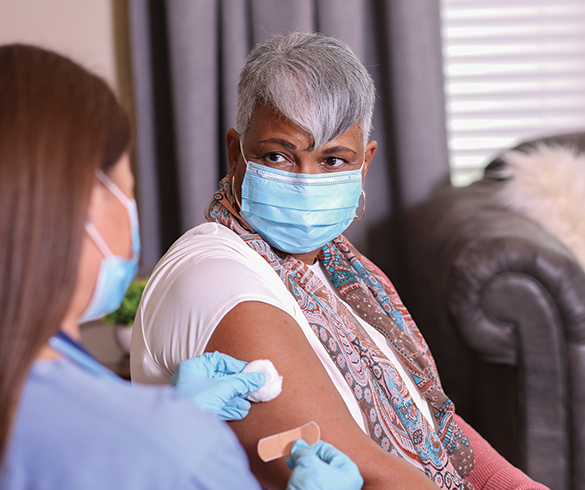
Seniors: Get Your Flu Shot – It’s Important!
Getting vaccinated for the flu is more important than ever. Not only will a flu shot help keep you and your family healthy, it can help reduce the strain on the healthcare system and keep hospital beds and other medical resources available for people with coronavirus disease 2019 (COVID-19).
This is no ordinary flu season; it’s a flu season amid a pandemic. With two dangerous viruses going around at once, it’s time for people to protect their communities by getting the vaccine already available: the flu vaccine.
And people with Medicare are at greater risk for serious complications from flu. A flu shot is an important preventive tool for individuals with asthma, diabetes, and heart and lung disease – chronic conditions that can increase the risk for serious flu-related health complications or even death. It’s the best protection from getting and spreading this flu virus, and it’s covered by Medicare at no cost. Medicare Part B covers one flu shot per flu season per beneficiary. You pay nothing for a flu shot if your doctor or other qualified healthcare provider accepts Medicare payment for giving the shot.
A flu shot won’t protect you against COVID-19, but it has many other important benefits. Flu vaccines have been shown to reduce the risk of flu illness, hospitalization, and death.
According to the Centers for Disease Control and Prevention (CDC), there’s no evidence that a flu vaccination increases your risk of getting sick from a coronavirus, like the one that causes COVID-19.
Those at high risk for flu complications include young children, pregnant women, people 65 years and older, and people with certain chronic health conditions. Anyone who is six months old or older should get a yearly flu vaccine.
The CDC recommends getting vaccinated in September or October, but a flu shot anytime during the flu season can help protect you.
Flu season in North America rarely begins before early October and usually lasts from December to March. In the past two years, the peak activity has occurred around mid-to-late February. Your body needs two weeks after a shot to develop a protective response to the influenza virus, so your best bet is to get vaccinated before the flu rate begins to climb.
Workplaces and other settings that usually provide flu shots may not do so this season because of the challenges of maintaining social distancing. For more information on where you can get a flu vaccine, visit www.vaccinefinder.org.
When going to get a flu shot, please practice everyday preventive actions and follow the CDC’s recommendations for running essential errands. Ask your doctor, pharmacist, or health department if they are following CDC’s vaccination pandemic guidance. Any vaccination location following CDC’s guidance should be a safe place for you to get a flu vaccine.
If you have a child over six months old who qualifies for Medicaid or the Children’s Health Insurance Program (CHIP), you may also qualify for a flu vaccination at no cost to you.
What’s the difference between flu and COVID-19?
Influenza (flu) and COVID-19 are both contagious respiratory illnesses, but they’re caused by different viruses. COVID-19 is caused by infection with a new coronavirus (called SARS-CoV2) and flu is caused by infection with influenza viruses. Because some symptoms of flu and COVID-19 are similar, it may be hard to tell the difference between them based on symptoms alone, and testing may be needed to help confirm a diagnosis.
It is possible to have flu and COVID-19 at the same time. Health experts are still studying how common this can be.
While it’s not possible to say with certainty what will happen in the fall and winter, the CDC believes it’s likely that flu viruses and the virus that causes COVID-19 will both be spreading.
The CDC has developed a test that will check for A- and B-type seasonal flu viruses and SARS-CoV2, the virus that causes COVID-19. This test will be used by U.S. public health laboratories. Testing for these viruses at the same time will give public health officials important information about how flu and COVID-19 are spreading and what preventive steps should be taken.
So please protect yourself, your family, and your community by getting a flu shot. Visit the doctor, pharmacy, or other local providers to get a flu shot today.
Information provided by the U.S. Department of Health & Human Services

Source:
Centers for Medicare & Medicaid Services



























